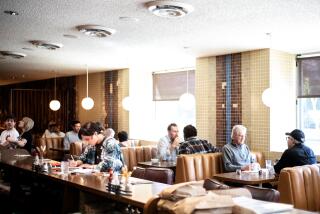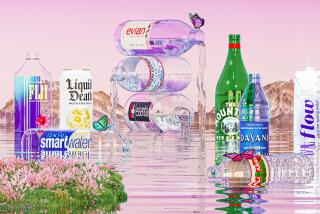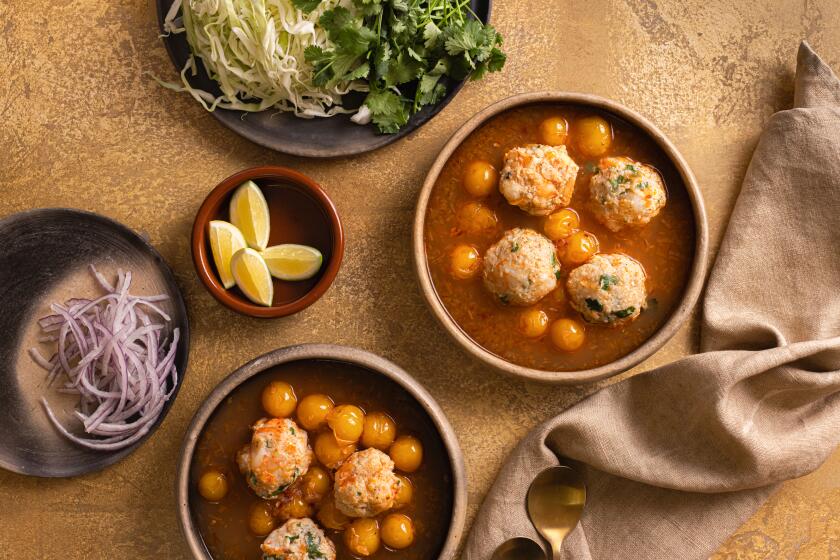Two Gold standards
Mark Gold, the esteemed marine scientist and president of Heal the Bay, knew it was only a matter of time before his older brother, Jonathan Gold, the equally esteemed Pulitzer Prize-winning food critic, would pick up a set of chopsticks and commit the ultimate act of fraternal betrayal.
“From his perspective, if you’ve already eaten Jamaican goat penis, what’s wrong with whale?” Mark asked.
Jonathan -- reached on his cellphone this week while eating puffer fish at Dae Bok in Koreatown -- first corrected his ever-tut-tutting brother:
“It was Vietnamese goat penis.”
Look, he added, he doesn’t promote eating whale. And it’s not as if the whale was harpooned in Santa Monica Bay.
He happened to be in South Korea, coming out of a whale museum, when, perhaps ironically, he came upon a row of whale restaurants. A man whose curious palate once led him to eat a live prawn as it glared back at him, antennae spiraling in fear, he knew he had to try. In his words: “It was there.”
And, he concluded, it was delectable.
Two prominent personalities in their own circles, Jonathan, 48, and Mark, 45, for years have been sparring, in good humor, about their differing gustatory predilections. But the whale eating, which Jonathan wrote about Oct. 16 in his widely read column in the L.A. Weekly, raised the ante in a most public way.
“A couple minutes later, a waitress returns with a platter of whale yuk hwe,” he wrote. “The vividly red meat has been cut into thin strips and tossed with sesame oil and slivered Korean pear, and I am surprised to discover that whale is delicious, leaner than beef, with a rich, mineral taste and a haunting, almost waxy aftertaste that I can’t quite place.
“I am already anticipating the nasty glare I will inevitably get from my marine-scientist brother, Mark, who as the leader of Heal the Bay has dedicated his life to pretty much the opposite of this.”
You can envision Jonathan chuckling aloud as he typed that last sentence -- much as he envisioned the “blankness” glazing the prawn’s eyes as it succumbed to blunt trauma in his mouth.
“I wonder where the line is,” Mark said this week as he drove from a meeting with Santa Monica officials over cleaning up the beach. “When does cannibalism come up as a food choice when you’re on the whale route?”
Mark first ripped Jonathan’s column in a letter to the Weekly, saying, “Bro -- now you’ve crossed the line. For far too long, you have been chowing down on every marine critter I’ve spent my life protecting, from shark’s fin soup to live prawns to bluefin to wild-caught sturgeon (largely freshwater). What did I do to you in our childhood to justify this ichthyocide?”
He then blogged about it Tuesday on the Heal the Bay website. Jonathan responded by ridiculing Mark’s gustatorily challenged taste buds: “The purity of my diet cannot be said to approach your daily menu of beef, diet root beer and pre-shredded cheese.”
It’s like a Cain-and-Abel comedy for the environmentally minded Westside set -- the only people who would actually know what Jonathan is talking about when he says in his defense: “After all, I’m not eating an omelet of least tern eggs garnished with Palos Verdes blue butterflies.”
Jonathan, Mark and their middle brother Josh have been jousting since they were boys growing up in a $280-a-month rental in the humble southeast corner of Beverly Hills. Their dad was a probation officer, their mom a librarian at Dorsey High School.
“Everything was fair game at the dinner table,” said Mark. “It was a very verbal household.”
Verbal, but hardly gourmet. Hamburger Helper was a staple.
“Mark’s palate was so tender that he insisted, when he had the Kraft macaroni dinner, on having it without the cheese,” Jonathan said, mocking him. “The cheese was too zesty.”
Jonathan was a music geek in high school, all-state in cello and bass. He went to UCLA, joined a punk band and reveled in the punk scene that thrived in L.A. in the late 1970s and early ‘80s. Taking the bus to his job as a copy editor downtown, he got the foodie bug when he attempted to eat at every single restaurant on Pico Boulevard. He became a music critic for the Weekly, then a food critic famous for celebrating hole-in-the-wall ethnic joints all over town. He did stints at Los Angeles and Gourmet magazines, writing about some of the most expensive restaurants in the country.
He maintains the look of a shipwrecked baron, with scraggly red hair and the stately girth of someone who can speak with authority about the variegated joys of pork fat.
Mark would fit better in a Dockers commercial. He was always the studious one. He also went to UCLA, and got a bachelor’s, a master’s and a doctorate before he left. He joined Heal the Bay in 1988 and became executive director in 1994.
All three brothers followed their own paths, to notable success. Josh is a Madison Avenue ad executive. Mark is one of the most prominent environmentalists in Southern California. And Jonathan last year became the first food critic ever to win the Pulitzer.
In California, John’s and Mark’s families, with five children between them, often get together for birthdays and dinners.
But the brothers have squared off over food for 20 years.
Mark says that when he eats seafood, he tries to follow the recommendations of the Monterey Bay Aquarium Seafood Watch list, which rates each fishery on its sustainability and the environmental effects of the harvest.
Jonathan counters that he mostly eats seafood that is low on the food chain and not in danger of extinction. On Mark’s blog, he wrote: “If you have spent the last 20 years of your life trying to protect sardines, mackerel and sea cucumber, Heal the Bay is in worse shape than I thought.”
Of course, his upcoming article on Gourmet’s website on a live octopus dish he tasted in South Korea is not going to help the familial discourse along.
“They bring you a plate of tentacles,” he said. “These tentacles still have an electrical thing going on. It looks like a plate of writhing worms. . . . It’s disconcerting. They crawl up your chopstick.”
Undaunted, he grabbed one of the wriggling arms and took a bite.
“The suckers are still active, so they adhere to the top of your mouth,” he said.
--
More to Read
Eat your way across L.A.
Get our weekly Tasting Notes newsletter for reviews, news and more.
You may occasionally receive promotional content from the Los Angeles Times.







